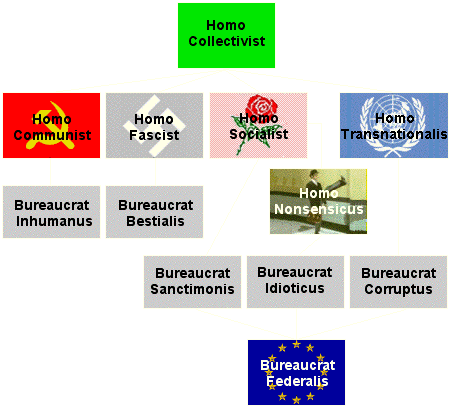
Who owns you?
|
|||||
|
Everyone in Britain will have to pay around £25 for a compulsory identity card under proposals being put to the cabinet by David Blunkett, the Home Secretary. The “smart” card will identify the holder using iris-recognition technology. Failure to carry the card will not be an offence but police will be able to order people to present it at a police station. So, you won’t need to carry the card with you at all time. How is that going to help the ‘fightagainstterrorism’? Ah, the terrorists will just report to a police station to show off their hi-tech faked ID cards… The charge is aimed at overcoming resistance to the scheme from the Treasury. Until now Cabinet support for a national compulsory identity card has been outweighed by the Treasury, which has objected to footing the estimated £1.6 billion bill. Notice how the main reason that ID cards have not been introduced is that the Treasury opposed the £1.6 billion bill. Concerns for privacy or individual rights? Blank stares around the Cabinet meeting table… While forcing people to pay for the card could add to the anticipated objections from human rights campaigners, Mr Blunkett believes that concern about national security is sufficient to ensure that individuals will be prepared to bear the cost. Damn, the one time Mr Blunkett uses the word individual is to charge him the cost of extending governments reach over the individual. Senior figures in the Cabinet strongly support the plan for the card, which would use a microchip to hold details including age, place of birth, home address and a personal number to identify the holder. It is also hoped that the card could be used to entitle the holder to a range of state benefits, thereby cutting benefit fraud. Mr Blunkett discussed his plan for a national ID card with Tom Ridge, the head of the US Department of Homeland Security, at a meeting in Washington earlier this month. Mr Blunkett agreed to develop a joint programme, using the same technology, with the US, which has already agreed a similar protocol with Canada. US and Canada?! Anglosphere, help! A report from AP about how Iraqis are trying to learn what it means to be free after more than thirty years of tyranny under Saddam. Apperently, more than 60 percent of Iraqis were born after Ba’athist party took power and it takes more than absence of Saddam and his henchmen to make sense of the alien concept of freedom.
The European Central Bank (ECB) is in talks with Hitachi Ltd. about embedding radio tags in euro bank notes to prevent counterfeiting of euros. The ECB is deeply concerned about counterfeiting and money laundering and is said to be looking at radio tag technology. Last year, Greek authorities were confronted with of 2,411 counterfeiting cases and seized 4,776 counterfeit bank notes while authorities in Poland nabbed a gang suspected of making and putting over a million fake euros into circulation. To add to the problem, businesses also find it hard to judge a note’s authenticity as current equipment cannot tell between bogus currency and old notes with worn-out security marks. Among the security features in current euros are threads visible under ultraviolet light. According to Prianka Chopra, an analyst with market research firm Frost and Sullivan the main objective is to determine the authenticity of money and to
Besides acting as a digital watermark, the use of radio chips could speed up routine bank processes such as counting. With such tags, a stack of notes can be passed through a reader with the sum added in a split-second, similar to how inventory is tracked in an RFID-based system. Hitachi is developing noncontact chips for use in bank notes and other paper documents, Kantaro Tanii, confirmed the company’s corporate communications manager for Europe. Hitachi’s Web site describes a 0.4-mm by 0.4-mm by 60-micron radio frequency identification chip, called the Mu Chip, that works in the 2.45-GHz frequency band and has a 128-bit ROM for storing its identity number. It was originally conceived as a bank-note-tracking device but could also be used in passports, driver’s licenses and other official documents. [SCENE 26. Int. LUCY’s bedroom. Night.] Open on shot of bedroom wall opposite the bed. There is a large mirror hanging on the wall. In the mirror we can see the reflection of LUCY and JOHN making wild, passionate love in the bed. Camera turns down and pans across bedroom floor, past assorted clothes discarded hastily in the fenzy of mutual lust. LUCY’s cries of climax drown out JOHN’s heaving grunts. Camera closes in on bed as JOHN rolls over. Both are glistening with sweat and breathless. LUCY: That… that was… fantastic! JOHN: Yeah… great. You were great. LUCY: Do you know what I want now? JOHN: What? LUCY opens the top drawer of her bedside table and produces two large carrots. LUCY: Want one? JOHN: Oh, you bet. LUCY hands one carrot to JOHN who begins to munch it manfully. LUCY nibbles her carrot, savouring the little bites. LUCY: Mmmmm… I just have to have a carrot after sex. JOHN: Yeah. Nothing beats a post-coital munch. LUCY: So, am I going to see you again? JOHN: Well, now that Sheila and I have split up… I reckon so. LUCY: Why did you two split up anyway? JOHN stops eating his carrot and looks away, trying to hide his shame. JOHN: She… she was a celery-freak!!! [END] There are many pleasurable benefits in writing for a blog such as this, not least of is revelling in the quality of our readership. This being the case, I can think of no finer endorsement of our efforts than that we attract thinkers and writers of the calibre of Andy Duncan, a regular reader who has produced an analysis of the strategy behind the EU project that I cannot possibly leave languishing at the bottom of a heap of comments where it currently resides. Andy’s hypothesis is so startlingly good, not just because of the thought that has gone into it but also because he admits to having once been a ‘creature of the night’. We can therefore safely assume that he knows whereof he speaks. So let him speak:
Marxist Hat ON David Carr asked:
…and sure enough, a reply has come from the arse end of the Anglosphere. 
There are just as many guns as there were before, except now people are angry that they have become criminals if they try to protect themselves, when American soldiers are more interested in protecting themselves than us. I suppose that to many Samizdata readers the quotes below will be old news. But it was newsworthy news to Patrick Crozier when he wrote it, and it was news to me when I read it about two days ago. I realise that two days in blog time is a lifetime, but I think this double titbit may still have enough pep left in it to be worth recycling here in full. I hope so.
And the morals of that are, I suppose, (a) that if you are still with Blogger and you are a technophobe, give them a few more months to fix their archiving nonsense; and (b) that blogging as a whole is about to conquer the known universe, or they wouldn’t be fighting over it like this. Patrick has been quietly writing things at CrozierVision, but hasn’t been telling anybody. What I’ve been telling him is: stick with your two blogs, CrozierVision and Transport Blog, and help the rest of us sort ourselves out. Transport Blog is slowly improving its regularity and broadening its scope, now that Patrick is being assisted by a handful of Transport Blog occasionals: me, Michael Jennings, David Farrer, with more to come I expect. It is slowly becoming a group blog. I wonder where he got that idea from. Patrick and I have been collaborating on the look of my two blogs, starting with the Education one. It has taken me months to persuade some blog-techno-savvy person to sit next to me in my kitchen and press buttons for me while I strode about making aesthetic judgements, because it has taken months for Patrick to decide that being blog-techno-savvy is what he does, but finally it has happened. The verdict so far is: a few like it and the antis have stayed quiet. Which is as it should be. I made it clear that I was only in the market for compliments and would be ignoring all complaints. The London-and-surrounding-areas blogosphere is showing no signs of running of out steam. A Message to the British People: Jacques Chirac wants to thank you vive le UK – Clio In the last few days Britain has been depicted as the Paradise (soon to be) Lost in the clutches of the Federasts. Hope has been expressed that the British public may stir eventually and oppose Blair’s finishing touches on handing over the country’s sovereignty. The word “bovine” has been mentioned in descriptions of the UK public and the adjective is excruciatingly close to the truth. Only with a public as sleepy and ‘tolerant’ of the destructive antics of its politicians and bureaucrats as the British public has been, a particular breed of Homo politicus characteristic to these isles could have evolved. The species, known as Bureaucrat idioticus can be found in most governmental bodies, with highest density around local councils. In the last 50 years, it has adapted to a change in its original natural habitat from large forested ministerial departments to smaller, murkier quango marshlands. It belongs to a larger family of Homo collectivicus, sub-group Homo nonsensicus, indigenous to Great Britain, a genetic dead-end variation on Homo socialist (see below). However, the most famous branch of Homo collectivicus family is Homo communist, spread around the globe in the last century but currently experiencing an evolutionary hiatus. The ubiquitous Homo socialist, another influential branch, occupies the same evolutionary niche in its biological family as the cockroach in the insect family. Finally, the recently prospering Homo transnationalis has made some headway to the top levels of the British public institutions, the Government and the Courts. In the last decade, the Bureaucrat idioticus has been inter-breeding with Bureaucrat corruptus (its continental variety, as well as with its closely related Bureaucrat sanctimonis), which resulted in a virulent Bureaucrat federalis whilst facilitating deeper and wider entrenchment of Homo transnationalis in Great Britain. Oh, we are so ready for the EU primeval soup!  Note: The ‘family tree’ for Homo Liberalis (original meaning) to follow. In case our esteemed readership has not yet heard of FLAIR (the Far-Left Alliance of Indignant Revisionists) I have the pleasure to relay an interview taken from its case files. The interview was conducted by Barry Fest, a long-time associate and one-time student of Brummagem Groat, who agreed to interview his erstwhile mentor on behalf of FLAIR. The occasion was the publication of Dr. Groat’s latest book, I Dunno: The Working Person’s Guide to Postmodern Relativism by the Belverton University Press. Dr. Groat is professor emeritus of Talkmatics at Belverton.
For the full text of the interview visit The Radical Capitalist. |
|||||

All content on this website (including text, photographs, audio files, and any other original works), unless otherwise noted, is licensed under a Creative Commons License. |
|||||